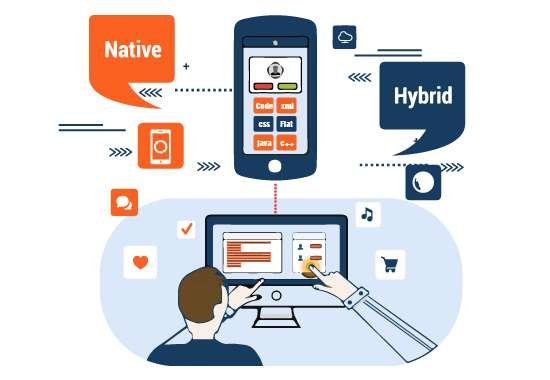Jessica is sleeping in the dreams of another world and suddenly a voice from her smartphone which is resting beside her pillow sounds, Hey Jessica! The sun has risen to welcome you, wake up! It’s time to embrace your new day.
How would you feel when your day starts with such a melodious voice with a touch of inspiration?
Well, Jessica is here a girl who is dependent on an app, and this voice is of Siri- a virtual assistant of iPhone. This app manages Jessica’s day-to-day life tasks and reminds her for the same timely.
This is an example that how modern life is dependent on technology for managing your household, professional, personal and other duties. From waking up in the morning to reaching office on time, everything happens over some taps on your mobile phone.
But have you ever noticed your phone curiously how some simple looking apps just perform certain tasks given by you and make your life easier and amazing?
Behind the scene of such applications, there are many mobile app development platforms which are evolving day-to-day to give you the best user experience at your voice commands or fingertips.

Today’s always running consumer has the access to all the information he requires at any moment. He relies on his mobile phone for everything whether it is searching for a utility store in his local area, finding routes while driving, or using a voice assistant to ask anything that he wants.
According to a report by Statista, mobile app development platform market is expected to reach 100 USD Billion at a rate of CARG 14% by 2022. On other side, consumers downloaded 204 billion apps in 2019 and it is estimated that app downloads will exceed 250 billion in 2022.
Companies understand this facet for selling products and establishing their brand value. Organizations need to go beyond having a website and content marketing strategy, and thus they value effective mobile-based promotion strategies.
In the era of digital revolution, business people need access to important data. More and more companies are moving from desktop websites to mobile applications to expand their online exposure.
Whether it is about consumer apps or enterprise mobile apps, choosing the best mobile development platform, isn’t a quick process. After all, it depends on your business goals, budget, and resources.
Moreover, what types of mobile app suit your product or service, it matters a lot to reach your target audience efficiently. And when it comes to deciding which mobile app development is right for your app, it becomes confusing.
Should you go with Hybrid Mobile App Development Platform or Native Mobile App Development Platform?

Here, eSearch Logix have come up with all you need to know about Hybrid and Native mobile app development platforms that could guide you through the advantages and disadvantages and under what scenario each platform is your best friend enhancing your business through an app.
On choosing which type of app suits best to your product or services, you should research data on the following key elements and do-
Segmentation based on platform: Windows, Android, and iOS.
Segmentation based on application: Gaming, education, banking, travel, e-service, e-commerce, social networking, media & entertainment, etc.
Research the data on the following market aspects-
- Market size
- Market segments and sub-segments
- Market trends and dynamics
- Supply and demand
- Technological breakthroughs
- Competitive landscapes
- Value chain and stakeholder analysis
Fix your target audience, is it-
- Small and large enterprises
- Entertainment industry
- Mobile application providers
- Education industry
- Research and consulting firms
- Government agencies

Now, it’s time to decide which app development platform either Hybrid or Native you should go with.
1. React Native
React native is supported by JavaScript and React. It is mostly preferred for developing native products over hybrid ones. However, React Native is generally believed a bit challenging for beginners. But you can easily find high-quality free tutorials on the internet.
Advantages
- It can use the code of different native platforms.
- Gives many helpful instruments to automate and accelerate development.
- Offers automatic error detection.
- Channelized with meaning apps, hot deployment which can be altered on a running server.
Disadvantages
- React Native has some sort of hardware flaws.
- Navigation is somewhere complicated, making the system hard to master for new users.
2. Ionic
Ionic is based on CSS and this platform gains its maximum potential when it is used jointly with AngularJS.
Advantages
- Highly reliable because of the feature of well-tested programming languages.
- It gives rapid development, which needs minimum extra actions on the user-end.
- Ionic enables the creation of complex and extraordinary apps when it is used with AngularJS.
Disadvantages
- App navigation is a bit complex.
- It gives low performance as compared to Native apps.
3. Mobile Angular UI
This app development platform is a right choice for anyone using AngularJS or Bootstrap. Mobile Angular UI is a full-fledged developer platform, free from external libraries and extensions.
Advantages
- It is entirely free extension, and facilitates the developer with some optional libraries.
Disadvantages
- Bootstrap’s internal issues sometimes incur failures.
4. jQuery Mobile
This framework has its own unique reputation. It doesn’t adopt a native look and works flawlessly in a variety of platform-specific state. jQuery Mobile is the best choice if you wish to develop something different instead of sticking to template designs.
Advantages
- Easy to explore menus make the apps highly user-friendly.
- This is not a new technology. It has been undergone various advancement and reach its ideal state.
- Developers need to give minimum efforts to create unique app elements.
Disadvantages
- Utilization of custom themes may invoke CSS-related issues.
- Problematic .NET interaction.
5. Native Scripts
Native Scripts is an open-source development platform to create native mobile applications backed with CSS, Angular, Typescript, and Vue.js. Many leading companies prefer Native Scripts due to its strong web empowerment framework.
Advantages
- It has robust backend support.
- It gives full direct access to android & iOS APIs.
- Executes rapidly compared to other platforms.
- Offers a way to split custom content.
Disadvantages
- Native Script apps are generally created in larger size.
6. React Native
Built by Facebook, this React Native is the great JavaScript library to create native applications for all devices and platforms. It allows developing platform-specific versions of various components making easy-to-use single codebase across multiple platforms.
Advantages
- It has various ready-to-apply components that help accelerate the process.
- React Native facilitates you to reuse codebase between iOS and Android, making it a full cross-platform development framework.
- It has simplified UI.
Disadvantages
- It has some sort of compatibility and debussing issues, that is why React Native is widely used by top tech companies.
- It lacks some custom modules.
Final words
As you can see here, app development platform market offers numerous options. To make the right choice, you should examine your needs and goals, and construct an image of your product or service, and choose the most suitable technology stack that resonates with your business prospects.


